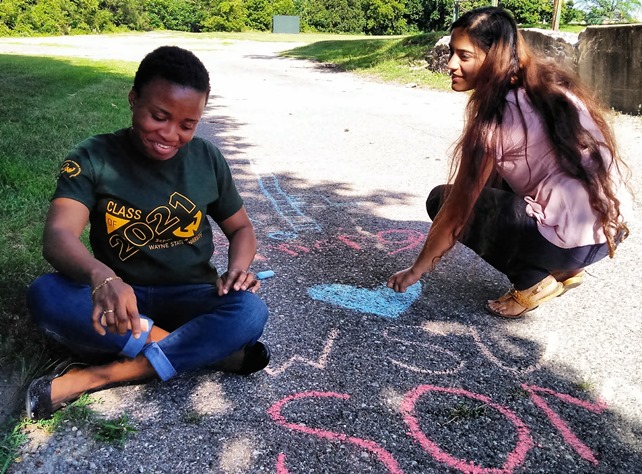
An interactive class, a children's book and an explanation of the 5-2-1-0 per day rule -- five servings of fruits of vegetables, two hours or less of screen time, at least one hour of physical activity and no sugary beverages.
These are three of the creative vehicles the 306 members of the Class of 2021 will utilize to represent 51 assigned service-learning projects at the Wayne State University School of Medicine's inaugural Community Impact Day, to be held March 8 in Mazurek Medical Education Classrooms 240 to 308.
The projects will be displayed from 10 a.m. to 12:45 p.m. All are welcome to attend and learn more about how the school and its students are responding to our diverse community's health needs, positively impacting eight of the top 10 chronic illnesses and diseases affecting Detroit residents. They include chronic lower respiratory diseases, cardiovascular diseases, hypertension, obesity, HIV/AIDS, pneumonia, diabetes mellitus and chronic kidney disease.
Students designed the projects to increase patient understanding of lifestyle choices and the management of chronic diseases that impact their health and the health of their children, using a variety of approachable mediums, from traditional brochures and posters to YouTube videos and songs.
"The Community Impact Day will be a great opportunity to move our projects from concept to reality through peer and faculty feedback. I am excited to see what I can learn from my classmates' projects and to have the opportunity to reflect on how our work can help our community," said first-year student Ally Flessel, who also serves as a service learning representative.
"The role is still evolving but at present we are involved in coordinating class service learning projects and assisting our individual learning communities with Co-curricular and volunteer questions. We are working on planning the impact day and will be helping to plan and run the service-learning portion of next year's orientation," she said.
Flessel's team put together an information card about endocarditis that also provides contact information for various opioid treatment centers in Detroit.
School of Medicine Dean Jack D. Sobel, M.D., will announce the event's most outstanding projects at a recognition ceremony at 1 p.m. in the Green Lecture Hall. Those chosen for the ceremony will be selected by fourth-year students who will provide feedback on what would, and would not, work in real-life clinical settings.
Since its founding in 1868, the Wayne State University School of Medicine has been dedicated to serving its community and transforming the promise of equal health care into a reality for all. That commitment has endured for more than 150 years, and is embedded into our medical education curriculum.
The projects are the work of the school's eight color-coded learning communities - blue, brown, gray, green, orange, purple, red and yellow. The learning community concept was introduced for the Class of 2021 in the 2017-2018 academic year. Each community includes 36 students assigned to one color. Those students are then assigned to a six- or seven-member cohort within that color. The latter makes up the students' community impact project team.
Project topics include those related to patient education, health care provider education, preventive care of chronic diseases and increasing physical activity in children and young adults. Titles include "How food behaviors can affect your child's future health," "The Medullary Pyramids Weren't Built in a Day - Take Care of the 7th Wonder of Your Body," "COPD in the D," "Hearts Skipping a Beat," "Healthy Eats" and more.
Service learning is part of the first-year Patient, Population, Physician course, which includes 10 clinical hours, 10 project hours, 10 outreach hours and five hours of seminars with reflections. The projects demonstrate the ability to work as a team, educate clients and/or patients during a health screening event and reflect on the experience of care.
All medical schools in the United States are required by the Association of American Medical Colleges to incorporate service learning into their curriculum in some way, but the School of Medicine takes the requirement several steps further, seeing it as an opportunity to make a real difference in the community while also bolstering longitudinal mentorship among the four classes, including pairing first-year learning communities with second-year students.
"We decided to focus ours on diseases specific to the area for a healthier Detroit. We are advancing the School of Medicine's mission by creating healthier communities through this learning initiative," said Jennifer Mendez, Ph.D., who directs the school's Co-Curricular Programs.